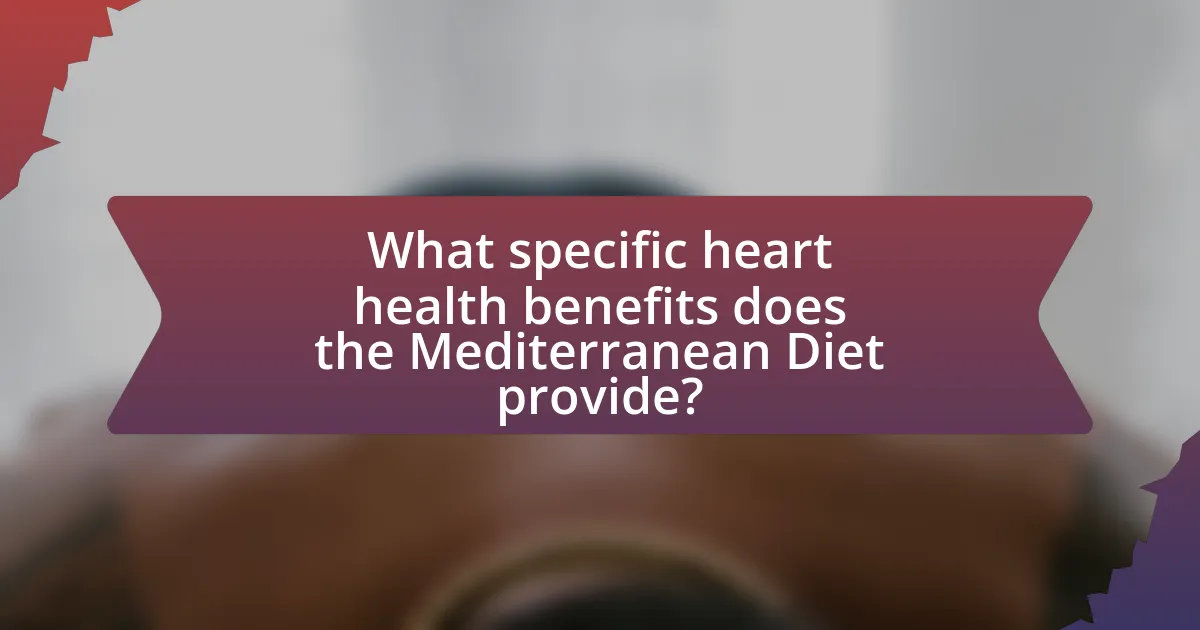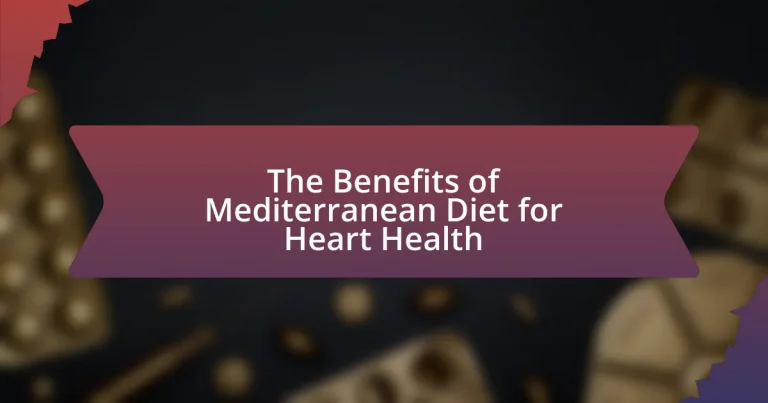The Mediterranean Diet is a dietary pattern inspired by the traditional eating habits of countries bordering the Mediterranean Sea, emphasizing fruits, vegetables, whole grains, legumes, nuts, and olive oil, while limiting red meat and processed foods. This diet is associated with numerous heart health benefits, including a 30% reduction in the risk of cardiovascular diseases, as supported by research such as the PREDIMED trial. Key components include healthy fats, particularly monounsaturated fats from olive oil, and a focus on plant-based foods, which contribute to improved cholesterol levels and lower blood pressure. The article will explore the specific heart health benefits of the Mediterranean Diet, scientific evidence supporting its effectiveness, practical steps for adoption, and strategies to overcome common challenges.

What is the Mediterranean Diet?
The Mediterranean Diet is a dietary pattern inspired by the traditional eating habits of countries bordering the Mediterranean Sea, emphasizing the consumption of fruits, vegetables, whole grains, legumes, nuts, and olive oil, while limiting red meat and processed foods. This diet is characterized by a high intake of healthy fats, particularly monounsaturated fats from olive oil, and a moderate consumption of fish and poultry. Research indicates that adherence to the Mediterranean Diet is associated with a reduced risk of cardiovascular diseases, as evidenced by a study published in the New England Journal of Medicine, which found that participants following this diet had a 30% lower risk of heart attack and stroke compared to those on a low-fat diet.
How is the Mediterranean Diet characterized?
The Mediterranean Diet is characterized by a high consumption of fruits, vegetables, whole grains, legumes, nuts, and olive oil, along with moderate intake of fish and poultry, and low consumption of red meat and dairy. This dietary pattern emphasizes plant-based foods and healthy fats, which contribute to cardiovascular health. Research indicates that adherence to the Mediterranean Diet is associated with a reduced risk of heart disease, as evidenced by a study published in the New England Journal of Medicine, which found that participants following this diet had a 30% lower risk of cardiovascular events compared to those on a low-fat diet.
What are the key components of the Mediterranean Diet?
The key components of the Mediterranean Diet include high consumption of fruits, vegetables, whole grains, legumes, nuts, and olive oil, along with moderate intake of fish and poultry, and limited consumption of red meat and dairy. This diet emphasizes plant-based foods, healthy fats, and lean proteins, which contribute to cardiovascular health. Research indicates that adherence to the Mediterranean Diet is associated with a reduced risk of heart disease, as evidenced by a study published in the New England Journal of Medicine, which found that participants following this diet had a 30% lower risk of cardiovascular events compared to those on a low-fat diet.
How does the Mediterranean Diet differ from other diets?
The Mediterranean Diet differs from other diets primarily in its emphasis on whole foods, healthy fats, and plant-based ingredients. This diet prioritizes the consumption of fruits, vegetables, whole grains, legumes, nuts, and olive oil, while limiting red meat and processed foods. Research indicates that adherence to the Mediterranean Diet is associated with a reduced risk of cardiovascular diseases, as evidenced by a study published in the New England Journal of Medicine, which found that participants following this diet had a 30% lower risk of heart attacks and strokes compared to those on a low-fat diet. This unique combination of nutrient-rich foods and healthy fats distinguishes the Mediterranean Diet from more restrictive or fad diets, promoting overall heart health and longevity.
Why is the Mediterranean Diet considered beneficial for heart health?
The Mediterranean Diet is considered beneficial for heart health primarily due to its emphasis on whole foods, healthy fats, and nutrient-rich ingredients. This diet includes high amounts of fruits, vegetables, whole grains, legumes, nuts, and olive oil, which are associated with lower levels of LDL cholesterol and reduced inflammation. Research published in the New England Journal of Medicine indicates that adherence to the Mediterranean Diet can lead to a 30% reduction in the risk of cardiovascular events, such as heart attacks and strokes. Additionally, the diet’s focus on omega-3 fatty acids from fish and anti-inflammatory compounds from plant-based foods contributes to improved heart health by enhancing endothelial function and reducing arterial stiffness.
What scientific evidence supports the heart health benefits of the Mediterranean Diet?
The Mediterranean Diet is supported by scientific evidence demonstrating its heart health benefits, particularly through reduced cardiovascular disease risk. A pivotal study published in the New England Journal of Medicine in 2013, known as the PREDIMED trial, involved over 7,400 participants and found that those adhering to a Mediterranean Diet supplemented with extra-virgin olive oil or nuts had a 30% lower risk of major cardiovascular events compared to a control diet. Additionally, a meta-analysis in the journal Circulation in 2018 reviewed multiple studies and concluded that the Mediterranean Diet is associated with lower levels of LDL cholesterol and improved endothelial function, both critical factors in heart health. These findings collectively underscore the Mediterranean Diet’s effectiveness in promoting cardiovascular well-being.
How does the Mediterranean Diet influence cholesterol levels?
The Mediterranean Diet positively influences cholesterol levels by promoting the consumption of healthy fats, such as those found in olive oil, nuts, and fish, which can lower LDL cholesterol and raise HDL cholesterol. Research indicates that individuals adhering to this diet experience improved lipid profiles, with studies showing a reduction in total cholesterol levels and a favorable increase in high-density lipoprotein (HDL) cholesterol. For instance, a study published in the New England Journal of Medicine demonstrated that participants following the Mediterranean Diet had a 30% lower risk of cardiovascular events compared to those on a low-fat diet, highlighting its effectiveness in managing cholesterol levels and supporting heart health.

What specific heart health benefits does the Mediterranean Diet provide?
The Mediterranean Diet provides specific heart health benefits, including reduced risk of cardiovascular disease, lower blood pressure, and improved cholesterol levels. Research indicates that individuals adhering to this diet experience a 30-40% lower risk of heart disease compared to those following a standard Western diet. This is attributed to the diet’s emphasis on healthy fats, such as olive oil, and high consumption of fruits, vegetables, whole grains, and fish, which contribute to better lipid profiles and reduced inflammation. Additionally, a study published in the New England Journal of Medicine found that participants on the Mediterranean Diet had significantly lower rates of heart attacks and strokes, reinforcing its effectiveness in promoting heart health.
How does the Mediterranean Diet reduce the risk of heart disease?
The Mediterranean Diet reduces the risk of heart disease primarily through its emphasis on healthy fats, whole grains, fruits, vegetables, and lean proteins. This diet is rich in monounsaturated fats, particularly from olive oil, which has been shown to lower LDL cholesterol levels and improve overall heart health. Studies, such as the PREDIMED trial, have demonstrated that adherence to the Mediterranean Diet can reduce the incidence of cardiovascular events by approximately 30% compared to a low-fat diet. Additionally, the high intake of antioxidants from fruits and vegetables helps combat oxidative stress and inflammation, further contributing to cardiovascular protection.
What role do healthy fats play in heart health within the Mediterranean Diet?
Healthy fats play a crucial role in promoting heart health within the Mediterranean Diet by reducing inflammation and improving cholesterol levels. The Mediterranean Diet emphasizes the consumption of monounsaturated fats, primarily from sources like olive oil, nuts, and avocados, which have been shown to lower LDL cholesterol and raise HDL cholesterol. Research published in the New England Journal of Medicine indicates that individuals following a Mediterranean Diet rich in healthy fats experienced a 30% reduction in cardiovascular events compared to those on a low-fat diet. This evidence underscores the importance of healthy fats in enhancing heart health through their beneficial effects on lipid profiles and inflammation.
How does the Mediterranean Diet impact blood pressure?
The Mediterranean Diet significantly lowers blood pressure. This dietary pattern emphasizes the consumption of fruits, vegetables, whole grains, nuts, and healthy fats, particularly olive oil, while reducing red meat and processed foods. Research indicates that adherence to the Mediterranean Diet is associated with a reduction in systolic blood pressure by approximately 7-8 mmHg and diastolic blood pressure by about 4-5 mmHg. A study published in the journal “Hypertension” by Estruch et al. (2013) found that participants following this diet experienced improved cardiovascular health, including lower blood pressure levels, compared to those on a low-fat diet.
What are the long-term effects of following the Mediterranean Diet on heart health?
Following the Mediterranean Diet has significant long-term effects on heart health, primarily by reducing the risk of cardiovascular diseases. Research indicates that adherence to this diet, which emphasizes fruits, vegetables, whole grains, legumes, nuts, and healthy fats like olive oil, is associated with lower levels of LDL cholesterol and improved blood pressure. A study published in the New England Journal of Medicine found that individuals following the Mediterranean Diet had a 30% lower risk of heart attack and stroke compared to those on a low-fat diet. Additionally, the diet’s anti-inflammatory properties contribute to better overall heart function and reduced arterial stiffness, further supporting cardiovascular health over time.
How does adherence to the Mediterranean Diet correlate with longevity?
Adherence to the Mediterranean Diet is positively correlated with increased longevity. Research indicates that individuals who closely follow this diet experience lower mortality rates, particularly from cardiovascular diseases. A study published in the journal “BMJ” by Trichopoulou et al. found that higher adherence to the Mediterranean Diet is associated with a 20% reduction in overall mortality risk. This diet, rich in fruits, vegetables, whole grains, and healthy fats, contributes to improved heart health, which is a significant factor in longevity.
What studies highlight the long-term heart health benefits of the Mediterranean Diet?
The PREDIMED study highlights the long-term heart health benefits of the Mediterranean Diet, demonstrating a significant reduction in cardiovascular events among participants. Conducted in Spain, this randomized trial involved over 7,400 participants at high cardiovascular risk and found that those following a Mediterranean Diet supplemented with extra-virgin olive oil or nuts had a 30% lower risk of heart attack, stroke, or cardiovascular death compared to a control group following a low-fat diet. Additionally, a meta-analysis published in the British Journal of Nutrition reviewed multiple studies and concluded that adherence to the Mediterranean Diet is associated with a lower incidence of coronary heart disease and overall mortality. These findings underscore the Mediterranean Diet’s effectiveness in promoting long-term heart health.

How can one effectively adopt the Mediterranean Diet for heart health?
To effectively adopt the Mediterranean Diet for heart health, one should focus on consuming a variety of whole foods, including fruits, vegetables, whole grains, legumes, nuts, and healthy fats, particularly olive oil. This diet emphasizes the intake of fish and poultry over red meat, while limiting processed foods and added sugars. Research indicates that adherence to the Mediterranean Diet is associated with a 30% reduction in the risk of cardiovascular disease, as demonstrated in a study published in the New England Journal of Medicine by Estruch et al. (2013). By prioritizing these food groups and maintaining a balanced approach, individuals can significantly enhance their heart health.
What practical steps can be taken to incorporate the Mediterranean Diet into daily life?
To incorporate the Mediterranean Diet into daily life, individuals should focus on consuming more fruits, vegetables, whole grains, legumes, nuts, and healthy fats, particularly olive oil. This diet emphasizes plant-based foods, which are rich in antioxidants and fiber, contributing to heart health. For instance, a study published in the New England Journal of Medicine found that adherence to the Mediterranean Diet significantly reduced the risk of cardiovascular events. Additionally, individuals can replace red meat with fish and poultry, aiming for at least two servings of fish per week, which provides omega-3 fatty acids beneficial for heart health. Meal planning that includes Mediterranean staples, such as hummus, Greek yogurt, and salads, can facilitate this dietary shift. Regularly cooking at home using fresh ingredients and herbs instead of processed foods also supports the principles of the Mediterranean Diet.
What types of foods should be prioritized in the Mediterranean Diet?
The Mediterranean Diet prioritizes whole foods such as fruits, vegetables, whole grains, legumes, nuts, and healthy fats, particularly olive oil. These food types are rich in nutrients and antioxidants, which contribute to heart health by reducing inflammation and improving cholesterol levels. Research indicates that adherence to the Mediterranean Diet is associated with a lower risk of cardiovascular diseases, as evidenced by a study published in the New England Journal of Medicine, which found that participants following this diet had a 30% reduced risk of heart attack and stroke compared to those on a low-fat diet.
How can meal planning support adherence to the Mediterranean Diet?
Meal planning supports adherence to the Mediterranean Diet by providing structured guidance on food choices that align with its principles. This structured approach helps individuals consistently incorporate key components of the diet, such as fruits, vegetables, whole grains, legumes, nuts, and healthy fats like olive oil, while reducing reliance on processed foods and red meats. Research indicates that individuals who engage in meal planning are more likely to maintain a balanced diet, which is crucial for heart health, as evidenced by studies showing that adherence to the Mediterranean Diet is associated with a 30% reduction in cardiovascular disease risk. By organizing meals in advance, individuals can ensure they meet the dietary recommendations of the Mediterranean Diet, thereby enhancing their overall health and well-being.
What common challenges might one face when adopting the Mediterranean Diet?
Common challenges when adopting the Mediterranean Diet include the availability of specific ingredients, the need for meal preparation, and potential higher costs. Individuals may struggle to find fresh produce, whole grains, and quality olive oil, which are staples of the diet. Additionally, the Mediterranean Diet emphasizes cooking at home, which can be time-consuming and may require culinary skills that some individuals lack. Financially, the diet can be more expensive due to the emphasis on fresh, high-quality foods compared to processed options. These challenges can hinder adherence to the diet and its associated heart health benefits.
How can one overcome barriers to following the Mediterranean Diet?
To overcome barriers to following the Mediterranean Diet, individuals can start by gradually incorporating Mediterranean foods into their meals, such as fruits, vegetables, whole grains, and healthy fats like olive oil. This gradual approach helps ease the transition and makes the diet more sustainable. Research indicates that a stepwise introduction of dietary changes can lead to better adherence; for instance, a study published in the Journal of Nutrition found that participants who made incremental changes to their diet reported higher satisfaction and lower feelings of deprivation. Additionally, planning meals ahead of time and seeking out Mediterranean recipes can alleviate the challenge of unfamiliarity with the cuisine, making it easier to stick to the diet.
What resources are available for those transitioning to the Mediterranean Diet?
Resources available for those transitioning to the Mediterranean Diet include cookbooks, online meal planning tools, and educational websites. Cookbooks such as “Mediterranean Diet for Dummies” provide recipes and meal plans tailored to this dietary approach. Online platforms like the Mediterranean Diet Foundation offer resources, including guidelines and recipes, to help individuals adopt this lifestyle. Additionally, apps like MyFitnessPal can assist in tracking food intake and ensuring adherence to the diet. These resources are supported by research indicating that the Mediterranean Diet can significantly improve heart health, as evidenced by studies published in journals like the New England Journal of Medicine, which highlight its benefits in reducing cardiovascular disease risk.
What are some tips for maximizing the heart health benefits of the Mediterranean Diet?
To maximize the heart health benefits of the Mediterranean Diet, focus on incorporating a variety of whole foods, particularly fruits, vegetables, whole grains, legumes, nuts, and healthy fats like olive oil. Research indicates that diets rich in these components can lower the risk of cardiovascular diseases; for instance, a study published in the New England Journal of Medicine found that participants following a Mediterranean diet supplemented with extra-virgin olive oil or nuts had a 30% lower risk of major cardiovascular events compared to those on a low-fat diet. Additionally, prioritize moderate consumption of fish and poultry over red meat, as this shift has been associated with improved heart health outcomes. Regular physical activity and maintaining a healthy weight further enhance the benefits of this diet, reinforcing its positive impact on cardiovascular health.





